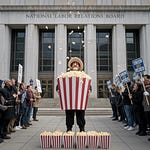WHAT THIS EPISODE IS ABOUT:
How employers communicate with employees during union organizing campaigns is under greater scrutiny than in years past.
In addition to her desire to ban so-called “captive audience meetings” and consistent with her August 2021 Mandatory Submissions To Advice memo, National Labor Relations Board (NLRB) General Counsel Jennifer Abruzzo, believes that it is “illegal for employers to tell workers who are considering unionizing that they would be giving up their right to interact directly with management.”
“It is Abruzzo’s latest challenge to long-standing employer practices she believes break the law and unfairly tilt the high-stakes votes on unionization petitions toward employers,” according to Law.com.
In the advice memo issued Jan. 31, Abruzzo cited these as examples of statements she might find unlawful; “If you sign a union card, you’ll be giving up your right to speak for and represent yourself,” and “You can’t just come to me [manager] anymore. You have to go to your union rep.” [Emphasis added.]
Despite the fact that the NLRB’s Basic Guide to the National Labor Relations Act states:
Once a collective-bargaining representative has been designated or selected by its employees, it is illegal for an employer to bargain with individual employees, with a group of employees, or with another employee representative. [Emphasis added.]
The NLRB’s guidebook (and the National Labor Relations Act) states:
Section 9(a) provides that any individual employee or a group of employees shall have the right at any time to present grievances to their employer and to have such grievances adjusted without the intervention of the bargaining representative provided:
1. The adjustment is not inconsistent with the terms of any collective-bargaining agreement then in effect.
2. The bargaining representative has been given the opportunity to be present at such adjustment. [Emphasis added.]
It employers’ omission of this latter part that GC Abruzzo believes is misleading and, therefore, violative of the law.
Given the new direction of the the current NLRB, in this episode of Labor Relations Radio, host Peter List provides a short refresher on “Do’s and Don’ts” for employers and their agents.
Two important points for listeners:
Nothing in this episode should be construed as legal advice. As an employer, if you believe you are under the threat of unionization, you are strongly encouraged to seek out competent legal advice from a competent labor attorney.
For this episode, as well as general learning, listeners should download the NLRB’s Basic Guide to the National Labor Relations Act (in PDF on NLRB.gov), as well as familiarize themselves with it.
You can access the PowerPoint covered in this episode of Labor Relations Radio at the link below.














Share this post